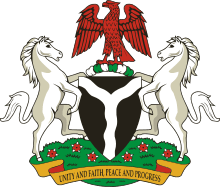Aro Confederacy
| Aro Confederacy | ||||||||||
| Omu Aro | ||||||||||
| ||||||||||
 Aro Sphere Of Influence | ||||||||||
| Capital | Arochukwu | |||||||||
| Languages | ||||||||||
| Government | Constitutional monarchy | |||||||||
| President | Eze Aro | |||||||||
| Historical era | Early modern | |||||||||
| • | Established | 1690 | ||||||||
| • | Disestablished | 1902 | ||||||||
| Currency | ||||||||||
| ||||||||||
Part of a series on the |
||||||||||||||||||
|---|---|---|---|---|---|---|---|---|---|---|---|---|---|---|---|---|---|---|
| History of Nigeria | ||||||||||||||||||
 | ||||||||||||||||||
| Timeline | ||||||||||||||||||
|
||||||||||||||||||
| See also | ||||||||||||||||||
|
| ||||||||||||||||||
The Aro Confederacy (1690–1902) was a political union orchestrated by the Igbo subgroup, the Aro people, centered in Arochukwu in present-day southeastern Nigeria. Their influence and presence was all over Eastern Nigeria, lower Middle Belt, and parts of present-day Cameroon and Equatorial Guinea during the 18th and 19th centuries. The Arochukwu Kingdom was an economic, political, and an oracular center as it was home of the powerful Ibini Ukpabi oracle, High Priests, the Aro King Eze Aro, and central council (Okpankpo).
Rise
By the mid-18th century, several Aro business families had migrated to the Igbo hinterland and to adjacent areas as a result of the rise of the demand for slaves and for palm oil. This migration, the influence of their god Ibini Ukpabi through priests, and their military power supported by their alliances with several related neighboring Igbo and eastern Cross River militarized states (particularly Ohafia, Edda, Abam, Abiriba, Afikpo, Ekoi, etc.), quickly established the Aro Confederacy as a regional economic power.
Confederacy
Aro activities on the coast helped the growth of city-states in the Niger Delta, and these city states became important centres for the export of palm oil and slaves. Such city-states included Opobo, Bonny, Nembe, Calabar, as well as other slave trading city-states controlled by the Ijaw, Efik, and Igbo. The Aros formed a strong trading network, colonies, and incorporated hundreds of communities that formed into powerful kingdoms. The Ajalli, Arondizuogu, Ndikelionwu, and Igbene Kingdoms were some of the most powerful Aro states in the Confederacy after Arochukwu. Some were founded and named after commanders and chiefs like Izuogu Mgbokpo and Iheme who led Aro/Abam forces to conquer Ikpa Ora and founded Arondizuogu. Later Aro commanders such as Okoro Idozuka (also of Arondizuogu) expanded the state's borders through warfare at the start of the 19th century. Aro migrations also played a large role in the expansion of Ozizza, Afikpo, Izombe, and many other city-states. For example, Aro soldiers founded at least three villages in Ozizza. The Aro Confederacy's power, however, derived mostly from its economic and religious position. With European colonists on their way at the end of the 19th century, things changed.
Decline
During the 1890s, the Royal Niger Company of Britain bore friction with the Aros because of their economic dominance and alleged human sacrifice. The Aro resisted British penetration in the hinterland because their influence economically and religiously was being threatened. The Aro and their allies launched offensives against British allies in Igbo and Ibibioland. After failed negotiations, the British planned on capturing the Aro Confederacy in 1899. By 1901, the tensions were especially intensified when British prepared for the Aro Expedition. The invasion of Obegu (in Igboland) was the last major Aro offensive before the start of the Anglo-Aro War. In November 1901, the British launched the Aro Expedition and after strong Aro resistance, Arochukwu was captured on December 28, 1901. By early 1902, the war was over and the Aro Confederacy collapsed.
Contrary to the belief that the Ibini Ukpabi was destroyed, the shrine still exists, and is intact in Arochukwu and serves mainly as a tourist site.
References
External links
- Arookigbo.com
- Countrystudies.us
- Nigeriafirst.org
- Apuncna.com
- Aronewsonline.org
- http://www.ebonyionline.com/the-concise-history-of-ozizza/